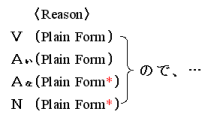ので hat die selbe Bedeutung wie それで (Lektion 17-9-1). Doch anders als それで , das an den Satzanfang gestellt wird, verwendet man ので im Satz.
*Bei affirmativen Na-Adjektiven und Nomina in der Gegenwart entfällt das だ am Ende der Plain Form und wird durch ein な vor ので ersetzt.

![]() 兄は びょうきに なったので、学校を 休みました。
兄は びょうきに なったので、学校を 休みました。
Mein älterer Bruder ist krank geworden und wird deshalb nicht in die Schule gehen.

![]() この テープは だいぶ 古いので、いい 音が しません。
この テープは だいぶ 古いので、いい 音が しません。
Diese Kassete ist ziemlich alt und hat daher keinen guten Ton.

![]() 図書室は しずかなので、よく べんきょうが できます。
図書室は しずかなので、よく べんきょうが できます。
In der Bibliothek ist es ruhig und man kann deshalb gut lernen.
Lesson 10-7「よく わかりませんから、もういちど 先生に ききましょう。」
Fragen wir noch einmal unsere(n) Lehrer(in), weil es noch unklar ist.
|
【~ので、それで】【~から、だから】
ので and それで are often followed by a fact or a phenomenon consequent to a
preceding event. They are rarely used with sentences which has the following endings: ×~でしょう (conjecture ; probably~) ×~ましょう (proposal, suggestion ; Lets'~) ×~なさい(imperative ; e.g., Do it.) ×~てください(request ; Please~) etc. On the other hand, から and だから are often used with the above sentence endings. |

